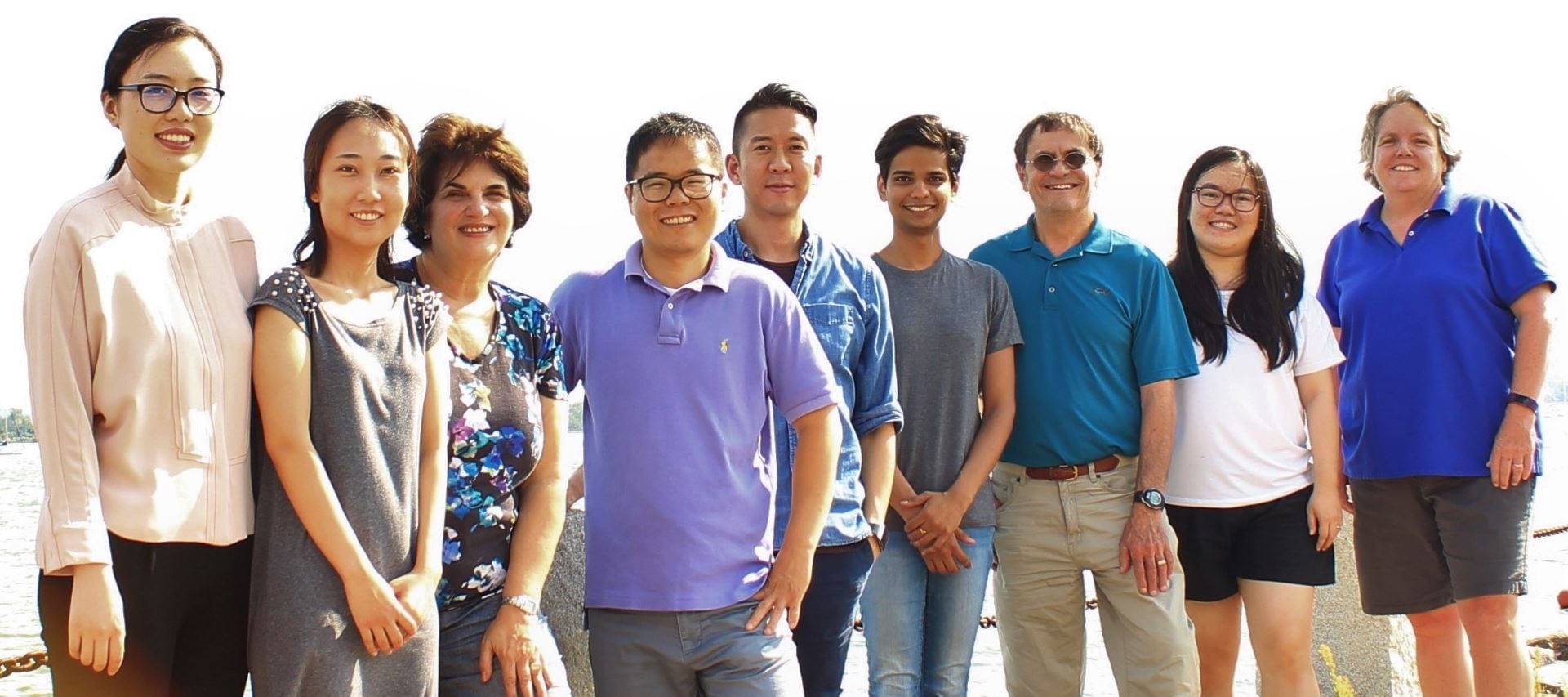
The Healthy Aging team, left to right: Wendy Wang PhD, Bon Kim, Nina Silverstein PhD, Jay Lee PhD, Sae Hwang Han, Shiva Prisad, Frank Porell PhD, Haowei Wang, Beth Dugan PhD. Team members not in photo: Natalie Pitheckoff and Evan Chunga.
A new report authored by a research team from the University of Massachusetts Boston provides a comprehensive examination of the health of a million older people living in the Commonwealth, including detailed profiles of every city and town.
The 2018 Massachusetts Healthy Aging Data Report, prepared by the team from the McCormack Graduate School’s Gerontology Institute, became available online Monday at HealthyAgingDataReports.org. The report, made possible with the support of the Tufts Health Plan Foundation, follows statewide research conducted by the same team in 2015 and 2014. The new research looked at health trends among residents over age 65 who make up about 15 percent of the state’s population.
“Since our last report, Massachusetts gained approximately 125,000 more people age 65 and older,” said associate professor Elizabeth Dugan, who leads the UMass Boston team. “The aging population in Massachusetts is growing more racially and ethnically diverse, too. But what was most striking to me is how the experience of aging could vary so profoundly based on where you live.
“The research team aims to equip policymakers and service providers with the information they need to make policies and practices giving everyone a fair chance to experience healthy aging,” Dugan said.
The Massachusetts 2018 Healthy Aging Data Report provides tools to help communities understand trends and disparities throughout the state. It contains detailed community profiles for every city and town in Massachusetts, plus neighborhoods in Boston, Springfield and Worcester. The website features more than 179 statewide health indicator maps showing the distribution of disease, health behaviors and the extent to which health varies by zip code across the state.
 “The Healthy Aging Data report is an invaluable resource for cities and towns across the Commonwealth,” said Massachusetts Secretary of Elder Affairs Alice Bonner. “Developing data-driven priorities and approaches is a cornerstone of creating more livable and welcoming communities for older adults.”
“The Healthy Aging Data report is an invaluable resource for cities and towns across the Commonwealth,” said Massachusetts Secretary of Elder Affairs Alice Bonner. “Developing data-driven priorities and approaches is a cornerstone of creating more livable and welcoming communities for older adults.”
Thomas Croswell, president and chief executive officer of Tufts Health Plan, noted that “Massachusetts is one of only three states to have access to such comprehensive data on healthy aging,
“We hope this new edition will spur action by cities and towns to consider how they can become better places to grow up and grow old,” he said.
Frank Porell, a UMass Boston emeritus professor and co-investigator, said the Massachusetts report shows community-level population health of older residents reflects more than the simple averaging of information about many individuals.
“Disparities in the population health across communities in the state illustrate that residential patterns play an important role in shaping how broad societal factors, such as race and ethnicity, socioeconomic disparities, the social environment, and the spatial organization of health services influence the health of individuals,” he said.
 UMass Boston gerontology professor Nina Silverstein, also a co-investigator, said the report can help policy makers and service providers make informed decisions about priority areas and where to allocate resources. “For example, what communities are in need of vaccinations or could benefit from long-range strategies to address obesity and diabetes? Where are mental health concerns on the rise?” she said.
UMass Boston gerontology professor Nina Silverstein, also a co-investigator, said the report can help policy makers and service providers make informed decisions about priority areas and where to allocate resources. “For example, what communities are in need of vaccinations or could benefit from long-range strategies to address obesity and diabetes? Where are mental health concerns on the rise?” she said.
Dugan presented the report’s results to a meeting of the Governor’s Council to Address Aging in Massachusetts on Monday. She said it was gratifying to see the team’s research impacting policy and everyday life in the state.
“We are grateful for the financial support of the Tufts Health Plan Foundation that allows us to create tools that ignite and accelerate social change for more age-friendly communities,” Dugan said.
The research team includes postdoctoral fellows Jay Lee, Wendy Wang, and graduate gerontology students: Bon Kim, Haowei Wang, Natalie Pitheckoff, Evan Chung, Sae Hwang Han, and Shiva Prisad. The team will be releasing a New Hampshire Healthy Aging Data Report in early 2019.

Leave a Reply